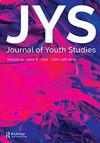Framing Covid-19 through memes: a way for young people to shape the narrative in Austria
IF 2.2
3区 社会学
Q1 SOCIAL SCIENCES, INTERDISCIPLINARY
引用次数: 0
Abstract
The Covid-19 pandemic and the intensified digitalization of life-worlds has especially affected younger generations, also in Austria. In this paper, we approach digital practices of 43 young adults between 16 and 18 years in a frame-analytical perspective to understand forms of politicization during the Covid-19 pandemic. We analyze memes in order to make sense of youth's life-worlds during the pandemic. The memes were created by youth as a result of a workshop series with the researchers. Our research shows that memes have provided a means for engaging and dealing digitally and emotionally with Covid-19-related problems. We show that the respective youth address educational, social and democratic issues by problematizing 'homeschooling as overburdening', a 'lack of planning' and 'social divisions'. Moreover, meme-creation offers a perspective on how youth express and create a 'sense of community' through digital practices. During the pandemic youth have increasingly come to understand and represent themselves as a group with shared experiences in digital space, going along with a positioning as 'younger generation' vis-a-vis older generations. We argue that the fact that the pandemic has affected youth heavily and the fact that they do not see their issues and needs represented by political representatives or media shows the potential and limits of digital spaces for younger generations to connect (politically). (PsycInfo Database Record (c) 2023 APA, all rights reserved)通过模因构建新冠肺炎:奥地利年轻人塑造叙事的一种方式
新冠肺炎大流行和生活世界数字化的加强尤其影响到年轻一代,奥地利也是如此。在这篇论文中,我们从框架分析的角度研究了43名16至18岁年轻人的数字实践,以了解新冠肺炎大流行期间的政治化形式。我们分析模因是为了理解疫情期间年轻人的生活世界。这些模因是年轻人在与研究人员的一系列研讨会上创造的。我们的研究表明,模因为以数字和情感方式参与和处理新冠肺炎相关问题提供了一种手段。我们表明,各自的年轻人通过解决“在家上学负担过重”、“缺乏规划”和“社会分裂”等问题来解决教育、社会和民主问题。此外,模因创作为年轻人如何通过数字实践表达和创造“社区感”提供了一个视角。在疫情期间,年轻人越来越多地将自己理解为一个在数字空间有着共同经历的群体,并将自己表现为“年轻一代”相对于老一辈的定位。我们认为,疫情严重影响了年轻人,他们没有看到政治代表或媒体代表他们的问题和需求,这表明年轻一代(在政治上)联系的数字空间的潜力和局限性。(PsycInfo数据库记录(c)2023 APA,保留所有权利)
本文章由计算机程序翻译,如有差异,请以英文原文为准。
求助全文
约1分钟内获得全文
求助全文
来源期刊

Journal of Youth Studies
SOCIAL SCIENCES, INTERDISCIPLINARY-
CiteScore
5.00
自引率
10.50%
发文量
82
期刊介绍:
Journal of Youth Studies is an international scholarly journal devoted to a theoretical and empirical understanding of young people"s experiences and life contexts. Over the last decade, changing socio-economic circumstances have had important implications for young people: new opportunities have been created, but the risks of marginalisation and exclusion have also become significant. This is the background against which Journal of Youth Studies has been launched, with the aim of becoming the key multidisciplinary journal for academics with interests relating to youth and adolescence.
 求助内容:
求助内容: 应助结果提醒方式:
应助结果提醒方式:


